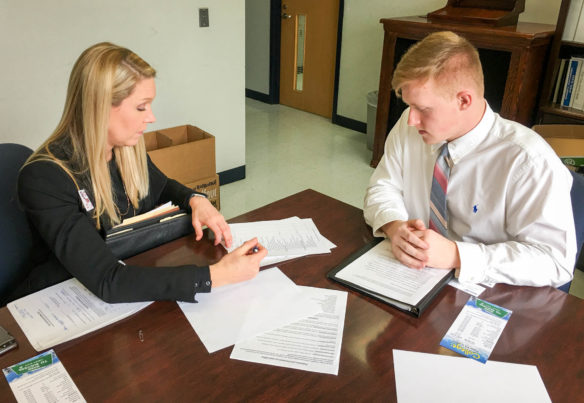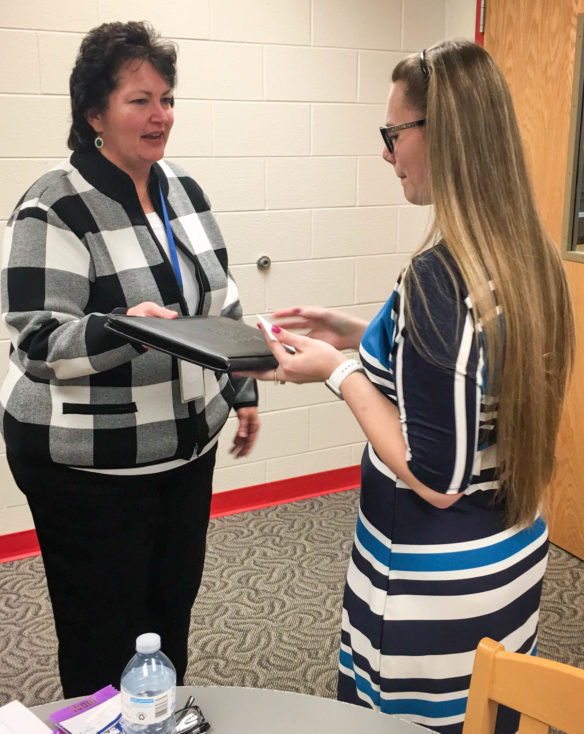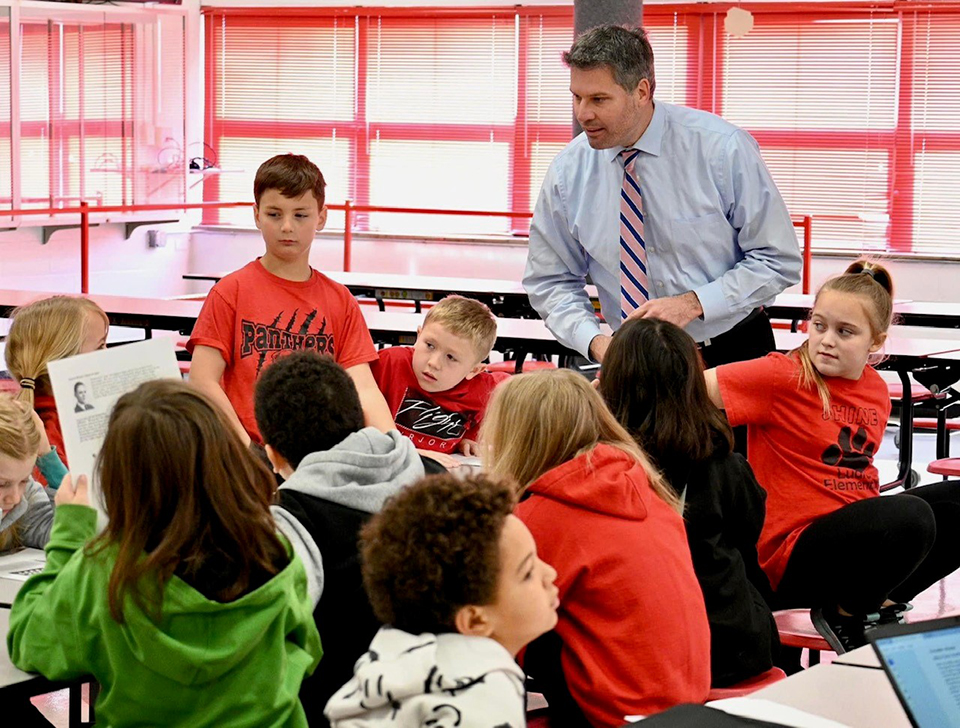
Garrett Duncan, right, a student at Calloway County High School, interviews with Allyson Foster, an executive adviser in the Kentucky Department of Community Based Services. The interview is part of a program in which high school students interested in a career in social work can obtain apprenticeships in local DCBS offices. Duncan was the first student enrolled in the pilot program, which fills a need in a field in which it can be difficult to recruit and retain workers.
Photo submitted
By Mike Marsee
mike.marsee@education.ky.gov
In Pike County, five high school students with a passion for their community are helping themselves while helping their neighbors get the services they need.
They are part of a pilot program that is offering students interested in a career in social work apprenticeships that allow them to work in local offices of the Kentucky Department for Community Based Services (DCBS).
Participants in the program, one of the first of its kind in the nation, are filling a need in a field in which it is often difficult to recruit and retain workers. High school students can enter the program through a career pathway and can earn dual credit through the Kentucky Department of Education’s (KDE) Tech Ready Apprentices for Careers in Kentucky (TRACK) youth apprenticeship program.
“DCBS needs full-time employees,” said Mary Taylor, a training and development specialist in KDE’s Office of Career and Technical Education who oversees the TRACK program. “Especially in a rural area, these jobs provide a stable income, and they can stay close to home.”
The program will target young adults – including high school students – who might be interested in social services careers but may not have had the opportunity to go to college. The program also targets those who may not have considered college. The pilot program that began this spring has placed high school students in five counties – Bourbon, Calloway, Floyd, Kenton and Pike.
Officials at DCBS, which is part of the Kentucky Cabinet for Health and Family Services, and the Kentucky Labor Cabinet connected with KDE as they worked to develop a pipeline for potential apprentices.
“We saw the opportunity to utilize the career pathway system and the TRACK program,” said Allyson Foster, an executive adviser to the commissioner of DCBS. “Instead of seeing a student graduate and not having a job or having to move, we saw an opportunity to employ some of those students. We have a workforce issue, they have a work issue.”
There are social services offices in all 120 Kentucky counties – more than one in some counties – and Foster said the need for workers in those offices isn’t going away.
“We’re the state’s largest employer and we have to serve the people,” she said. “The population is not going to go away and the need is not going to go away, so it just makes sense.”
Tracy Osborne-Clay, an apprenticeship coordinator with the Labor Cabinet, said the program also makes sense for students, who are required to submit a resume and to go through an interview process.
“It really starts helping them develop those soft skills that employers look for, and also some responsibility and accountability,” Osborne-Clay said.
Participants in the apprenticeship program must complete 144 hours of classroom training and 2,000 to 4,000 hours of on-the-job training. Eligible high school juniors and seniors participate as co-op students and may enroll in TRACK to earn dual credit in addition to apprenticeship wages.
Apprentices may choose from three positions within DCBS’ Protection and Permanency and Family Support offices – office manager, social services and family services – and will learn about each role in their office through guided rotations. Taylor said that when the pilot was being established, KDE had to determine which career pathway would be the best fit.
“We looked at the business management career pathway, because we have courses in financial literacy, accounting, office management and digital literacy,” said Betty Montgomery, KDE’s business and marketing program consultant. “Students must have completed two courses and be enrolled in a third to be considered a preparatory student in a career pathway.
“DCBS picked out the courses that they wanted the students to be exposed to. For example, we are implanting an ethical leadership course beginning in the fall of 2018 in all business and marketing career pathways, which DCBS expressed an interest in all TRACK students completing.”

Emily Ray, right, a student at Belfry High School (Pike County), talks with Betty Montgomery, the business and marketing program consultant at the Kentucky Department of Education, during her interview. Five students from Pike County schools are working as apprentices in offices of the Kentucky Department for Community Based Services in their home county, and the pilot program has placed students in DCBS offices in five counties.
Photo submitted
Business management won’t be the only career pathway through which students can enter the program, however. This fall, family and consumer sciences students will be able to enter the program as family support specialists, Taylor said.
Foster said the first student apprentice in the pilot program started work in a DCBS office in Calloway County early this spring, and the last three started in mid-June. She said students are typing notes, filling other office roles and even observing court proceedings to better understand their work.
“All of our students have been able to make major contributions to our offices,” she said. “They’re not working on cases, but they’re making contributions,” she said.
Students were placed in DCBS offices where there was a need due to either high traffic or high turnover.
“One person pulling 22 hours a week in your office can really take the strain off, and a fresh face can be a morale boost,” Foster said. “They’re filling some gaps where we didn’t know we had gaps.”
Five students from two Pike County high schools are working at offices in the county, though Foster said DCBS only planned to use about three there. Three girls from Shelby Valley High School were interviewed, and all three were brought into the program. At Belfry High School, two students were so eager to participate and so well-suited for the job that both were hired. At both schools, their business teachers rearranged the students’ schedules to make it easier for them to participate.
“You want to foster that passion and capitalize on that,” Foster said.
In Kenton County, an apprentice from Holmes High School (Covington Independent) of Guatemalan descent has become an advocate within her office for a population that has settled in the area.
“We just really have come into some great circumstances,” Foster said.
Foster met every student during the interview process and has shadowed some of them since they started working in their respective offices.
“Every time I walk in they get excited and they say, ‘Thank you, I love it here.’ They’re very proud,” she said. “I’ve watched three of them break out of their shells from the interview to the correspondence to now.”
Montgomery said DCBS alerts staff at KDE to an opening in a given county, then she turns to business management career pathway teachers to help her find a good fit.
“The teacher vets the students, and they select who they feel would be a good match based on the job description,” she said.
Apprentices could be in the program for up to 2 1/2 years, and Foster said they will have a wealth of skills when their time in the program ends. She said the goal for DCBS is that they continue to use those skills in its offices, but the apprentices will benefit whether they stay or go elsewhere to work.
“Obviously, we would love for them to grow with us in state government, but this career builds so many skills, they could go out and truly do anything with the skills they get there,” she said. “We may be changing the outcome for these students.”
Foster said DCBS plans to expand the program, and but how quickly and where it spreads will depend heavily on the staffing needs of individual offices. Taylor said KDE will be there to provide the students.
“We’re ready at the secondary level; it’s just a matter of how quickly DCBS wants to expand,” Taylor said.
Osborne-Clay said this program could serve state government as well as the students who participate.
“We support a pipeline of growing your own workforce, which is the message we send out to industry, and now state government has the opportunity to do that,” she said. “I foresee other sections of state government looking into it as well.”
The Labor Cabinet’s “Kentucky Trained. Kentucky Built.” Apprenticeship campaign focuses on growing local apprenticeship pipelines, and Osborne-Clay said she thinks this program will attract interest from the private sector as well as it continues to grow.
“Having DCBS lead the way encourages private industry and other business,” Osborne-Clay said.
MORE INFO …
Allyson Foster allyson.foster@ky.gov
Betty Montgomery betty.montgomery@education.ky.gov
Tracy Osborne-Clay tracy.osborneclay@ky.gov
Mary Taylor mary.taylor@education.ky.gov



Leave A Comment